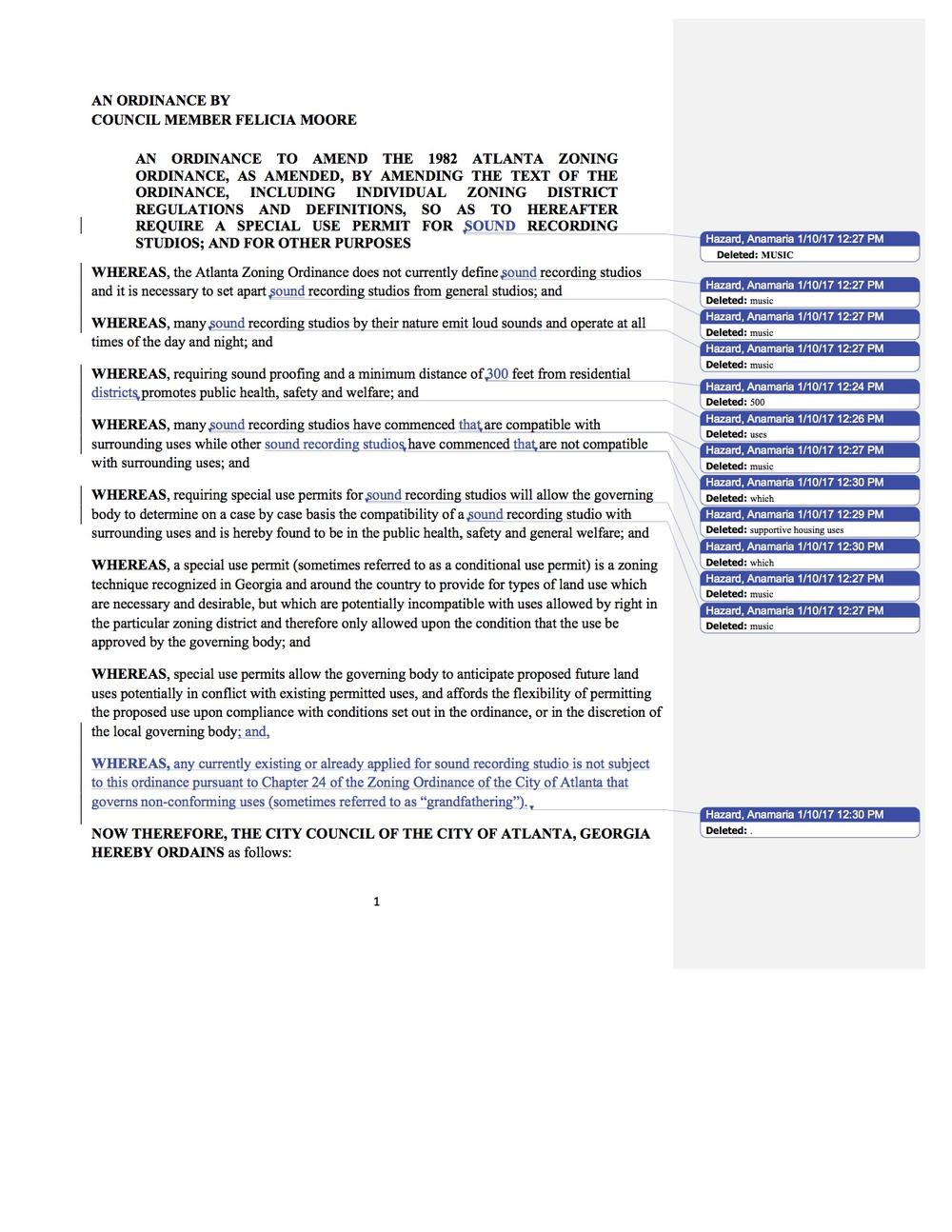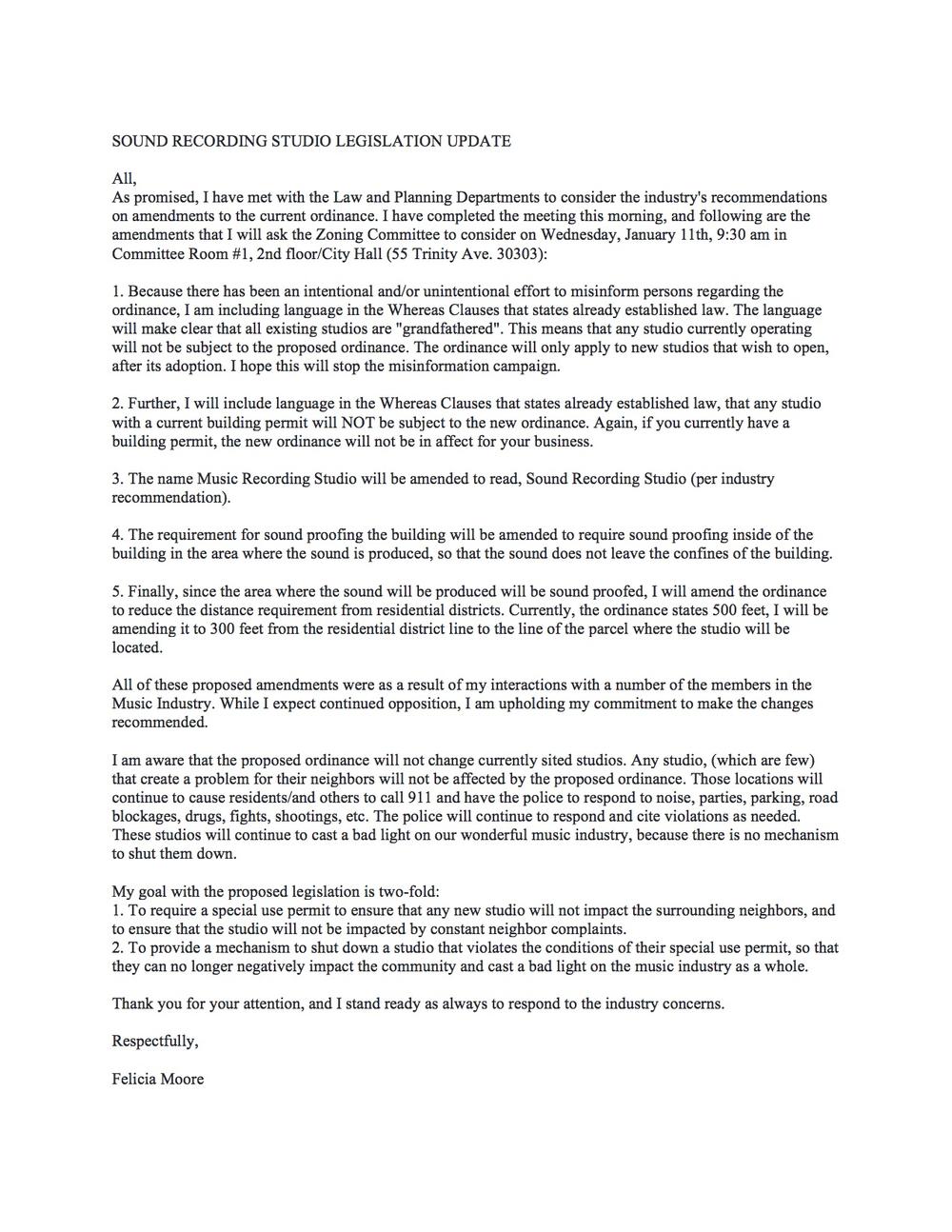Section Branding
Header Content
Atlanta Music Ordinance Harmful, Studio Owners Say
Primary Content
There's a measure before the Atlanta City Council that would impose tougher restrictions on newly built music recording studios.
Supporters say it addresses problems with noise in residential areas. Studio owners are calling it misinformed and harmful to Atlanta's $4 billion music industry and 80 privately-owned studios.
I brought in Dina Marto, owner of Twelve Music Group, and Tricky Stewart, owner of Triangle Sound Studios, to give their thoughts about the ordinance.
On what goes on in a music studio
Dina Marto: It's a facility that allows you to record music: vocals, production, songwriting. Everything that has to do with making a song. Now with the digital stuff going on anything can be a studio really - if you have a microphone, Pro Tools and some speakers.
On music studios being noisy, late night problems
Marto: If it's a properly built studio, you shouldn't hear much noise coming out of there. That might be just the people hanging out outside. I think [Council Member Felicia Moore] might be a little mistaken on what that noise [is] where that noise is coming from.
On the history of Atlanta’s music industry
Tricky Stewart: The music industry here has grown tremendously. When I came here in the early '90s, we had LaFace Records here, we had Jermaine Dupri and Dallas Austin who were putting a huge footprint out there globally in music and essentially became the attraction.
We were able to take the greatest talent coming from the southeast region and almost guarantee they would show up here before they would show up to New York or L.A. The whole music industry has brought such a light to our city. It eventually got to the point where the film industry wanted to be part of it.
On how music studios in Atlanta are different than other cities
Stewart: The difference between what's going on here is that the producers and the owners of these businesses are people that you know. I've always been able to go into Silent Sound and not just be a client or go to Dina Marto’s studio and know that Twelve Studios is there, or go to DARP and know that Dallas Austin was there, or you know my studio as being a producer. It's actual faces. It's actual people.
Marto: And it's a tight-knit community. I just want to add that Atlanta in general has this special creative sauce that no other city has. I think that's why we've been the leader in pop culture trends, dances, music (especially on the urban side) for probably 20 years now.
On whether the proposed amendments to the original ordinance, such as lowering the required distance from a residential area to 300 feet, is enough for them to support the ordinance
Marto: No. Those are great amendments. When she created the ordinance she didn't really have a great understanding of how the music business operates. Especially studios. So we were pushing for her to make these amendments, because if this ordinance does get passed at least the amendments will make sense.
But we are urging the council people to really vote no, because we believe this is going to hinder growth in the music industry and for Atlanta in general. And so we really don't want this to pass at all.
On whether the city should have a right to shut down music studios for violating noise ordinances
Stewart: I think from that standpoint ... you don't know where the noise is coming from. And there's so many people that are going to just round things up to what they think is going on in a particular area. But it does not mean that that noise that they're hearing is coming from the place that it's coming from.
When you deal with bars and you deal with gas stations, you deal with patrons and people coming in and out ... I don't know why she thinks that studios are making noise. Most people stay inside the studio. No one's ever trying to be outside of the studio. Everybody wants to be in the studio.
Once you go in there it is a quieter environment. There's no sound coming out of these buildings. I just think this whole thing is just a little bit overreaction. And from my standpoint, I don't even want to listen to the legislation and the amendments that she's made, because for me it's a full rejection. Because it's an overreaction.
On what studio owners think is the real problem city leaders need to address
Marto: It's not the studio owners. It's not the guest at the studio. It is crime that you should be targeting. That's what's causing all the issues. And that's why in Council Member Moore’s district there was such a big hoopla going on. It's really a crime issue. Atlanta has some crime issues that they need to address.
Stewart: Everything's just being swept into this ordinance. I don't think we have have a clear understanding of what it is and who it is and if there's multiple violations to a particular business.
Yes, I think you should be able to regulate individual businesses if they have a problem, but let's just first make sure that the businesses that we're talking about are the right businesses.
Marto: Oftentimes it’s in the parking lot of a building and then it's just tagged onto the studio.
They don't even know if that person was in the studio or not in the studio, they just attach it. Because the easiest thing to do is to attach it to hip-hop culture and Tricky makes such a great point. He's like “People always want to make Atlanta always hip-hop and urban.” But he's been making pop hits for quite some time.
Stewart: I do pop music for the most part. I do Katy Perry here. I do Mariah Carey here. Beyoncé. There's no noise outside of my studio and the studios that I go to. I know for a fact that these owners of the studios make sure that their guests are extremely respectful.
The real music industry doesn't want to be around other people. They want to be secluded in their own studio. So they're not just out on the streets you know hanging out making music. That's not how it works.
Even in this legislation there's so much that they're not talking about when they say be this far away from residents and this and that. The truth of the matter is every day we're restructuring the city, and people are moving into areas where the studios are because they want to and they want to be in the cool spot.
When I first got my building there was nothing within miles of me. There was nothing strange to be around. Now there's apartment complexes around. So from that standpoint, should they have to check with us if we were there first? We’re the ones that came here that are part of bringing these economic booms to the city in the first place, and why it's attractive.
On the double standard of supporting Atlanta’s hip-hop success while shunning the business
Marto: It is so weird because I think that we love all the perks that we get with creating hip-hop here and being known for being a hip-hop city. But then at the same time we don't want to embrace the music business here. We kind of shun it whenever it's convenient for us. So it's like 'Are you with us or not? Are you against us?' Which one is it, because you get so many perks from the music that's made here and the celebrities that move here?
On the economic impact of Atlanta’s music industry
Stewart: We're trying to get to $10 billion. I think that's a good number. That’s what Austin, Texas has. That's what Nashville has. That's about what the average is. But there's so much more that goes into their music industry and so much more appreciation that they accept.
Nashville, they embrace and love their music industry there. It's like with us, they're like 'Oh OK, that's cool. But no we're not going to support you in any way. As a matter of fact we're going to create ordinances that hinder your growth that don't make sense to your industry that cause issues for people that have been working here quietly for so many years.' And it's really it's not fair.
We're trying to grow our entertainment industry. We're not trying to make it smaller. And the big thing about this is not just the fact that we are studio owners. It's about the people that come here are also entrepreneurs. We're talking about people that came here, started very successful businesses and are able to employ lots of people ... whether it's through touring, whether it's through management groups, whether it's through the actual staffs that are at studios. You look at a city like Austin where it's completely the opposite. They don't have nearly the amount of star power and things that we do. The musicians there get free health care.
Marto: And not to mention the education piece with the interns that come in, the students that we get. I'm connected to the Recording Connection. They send aspiring engineers to get hands-on experience at the studio. You're teaching the next generation, and not to mention I'm a minority female entrepreneur in the city.
Do you think that if Atlanta's record industry weren't hip-hop you'd be having the same problems?
Stewart: Probably not.
Hip-hop is something that’s for the kids. It's not something that the people that are putting together the ordinance understand. I think there's just a generational thing a little bit, because this is the music speaking loud and clear to millennials. This is the new rock and roll. But if we were all here producing Céline Dion and Adele it would probably be a completely different line.
Marto: Hip-hop just gets a bad rap, no pun intended. Hip-hop is not meant to raise your children. You have to raise your own children. This is entertainment. This is what the children like to listen to. We're not here to raise your kid when we make hip-hop music.
On self-policing measures Atlanta studio owners are taking
Stewart: We feel like we're under attack.
We are definitely jointed and joined together tighter than we've ever been. This is our first bit of adversity. We've been here for years operating successful businesses, and for the most part it's the kind of thing that is so private. We don't want people to know where we are. It's not the other way around.
But at this particular time with us having this adversity, the people who feel like we are the backbone of this industry have definitely been spending a lot of time through text messages, through e-mails, through telephone calls and through support just really getting an understanding of what's really going on.
And we’re making sure that we can get out in front of this. This is an attack coming from that mentality of ‘Get a real job, have a backup plan.’ People don't know that this is a legitimate business with legitimate executives, so they don't always look at how it really is.
They think it's fun. They think is a big party. This is a business, you know and businesses are being put in this position.
So right now we're having to take off our creative hats.




